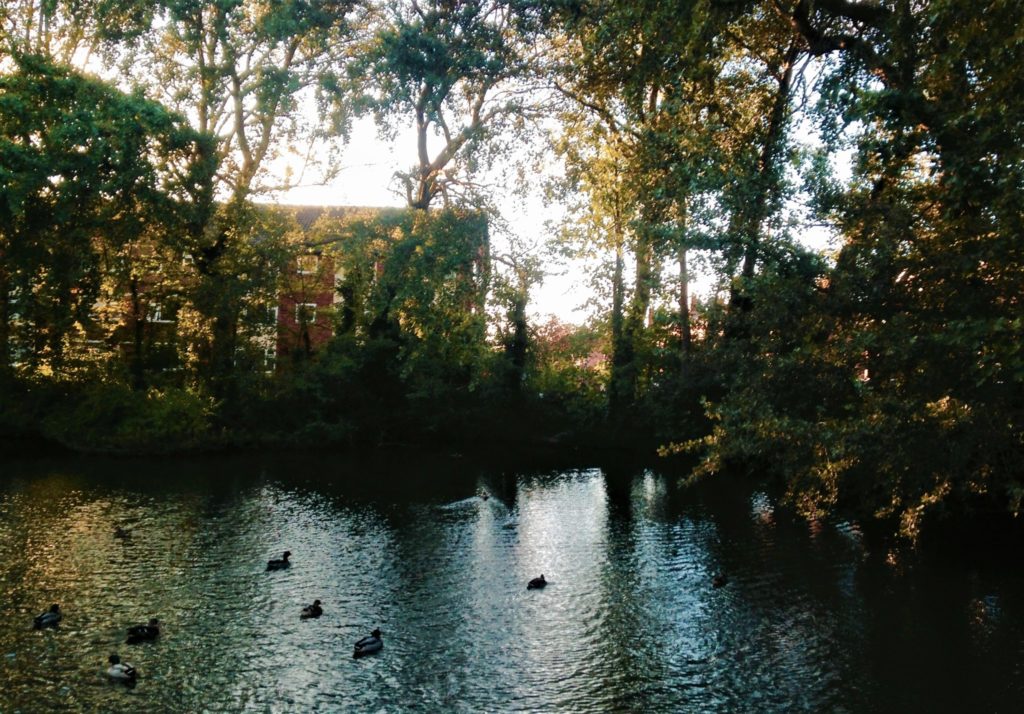
As soon as I arrive at the faded black railings of the duck pond, here they come, all the ducks gather round me, hoping for a morsel. Sadly, I have nothing for them. Just a short distance away from the centre of Crosby – a middle-class enclave of Merseyside – Victoria Road duckpond is a little slice of nature right in the middle of the suburbs, incongruously disconnected from any parks or other greenery. It is just a solitary duckpond, surrounded by houses and tower blocks. It seems like a rare thing.
Fortunately for the ducks, a little girl and her grandmother arrive bearing snacks. For a moment I worry that their bags contain breadcrumbs, but as they scatter their feed across the water, it appears they have brought a more suitable meal for the ducks; seeds, grains and the like. Bread is not necessarily bad for the ducks, it just has no nutritional value and can, therefore, stunt the development of ducklings and lead to malnutrition. However, this is not the main concern regarding the millions of loaves (six million a year in England and Wales alone) we feed to ducks in the UK. As the ominous poem inscribed on the sign at Victoria Road duckpond explains:
Darren and Daisy duck use the pond for a home,
But do people know they don’t live here alone,
People think they are being kind, feeding them with bread,
But if you look beneath the surface, a lot of the creatures are dead!
It is actually the after-effects of the bread that can lead to a lethal environment for the various wildlife who share the pond, resulting in water pollution and the attraction of vermin. Hence:
Freddy the frog would love to survive,
But with all the pollution how will he thrive?
Having thrown all their feed, the girl and her grandmother walk back whence they came, and the ducks drift away, gliding as a synchronised entity towards the muddy banks of the pond. Too slow for their elders, a couple of ducklings fall behind; they panic, chirping and spinning in circles until, phew, they spot their kin and quickly swim towards them.
The water looks encouragingly clear today, but I was horrified to read in a ‘Liverpool Echo’ article that, just a few years ago, the duckpond had been identified by the local council as a “grot spot” teeming with refuse, including wheelie bins and shopping trollies. I was even more horrified at the thought that I was very closely acquainted with the person who had, along with several of his hooligan friends, hurled a shopping trolley into the pond during a spree of drunken teenage chaos.
We tend to worship youth in our society, and there are plenty of valid explanations for that. Anyone who has ever identified the innate poetry in the words of a child understands why youth is so valuable. But there is a reason why other cultures hold the wisdom of age and experience in such high regard. Surely, that grandmother with her eco-conscious birdfeed is highly unlikely to throw a shopping trolley into the duckpond, whereas the hormone-crazed adolescent hardly gave it a second thought.
Now, staring at the ephemeral ripples of the pond, I feel a deep antipathy for that adolescent. Even though he was so young and it was so long ago, there is hardly a more pathetic form of vandalism to perpetrate. How would he like it if someone chucked a shopping trolley through his living room window? I am sure he is a particularly flawed human being, but I hope the shame of his youthful vandalism has spurred him to grow into a person who at least cares about ducks.
Soon, as winter brings its mighty cold, the duckpond will freeze, and the ducks will have to find another place to shack up for a while. I will make sure to visit them before then. Next time I will bring them some nice seeds, maybe some lettuce. Apparently they love lettuce.
With the existential nightmare of the climate crisis constantly looming, it can be easy to forget about these humble micro-ecosystems. But maybe if we learned to look after the little things, we would be more inclined to seriously care for the biosphere. Though who am I to judge?




Comments